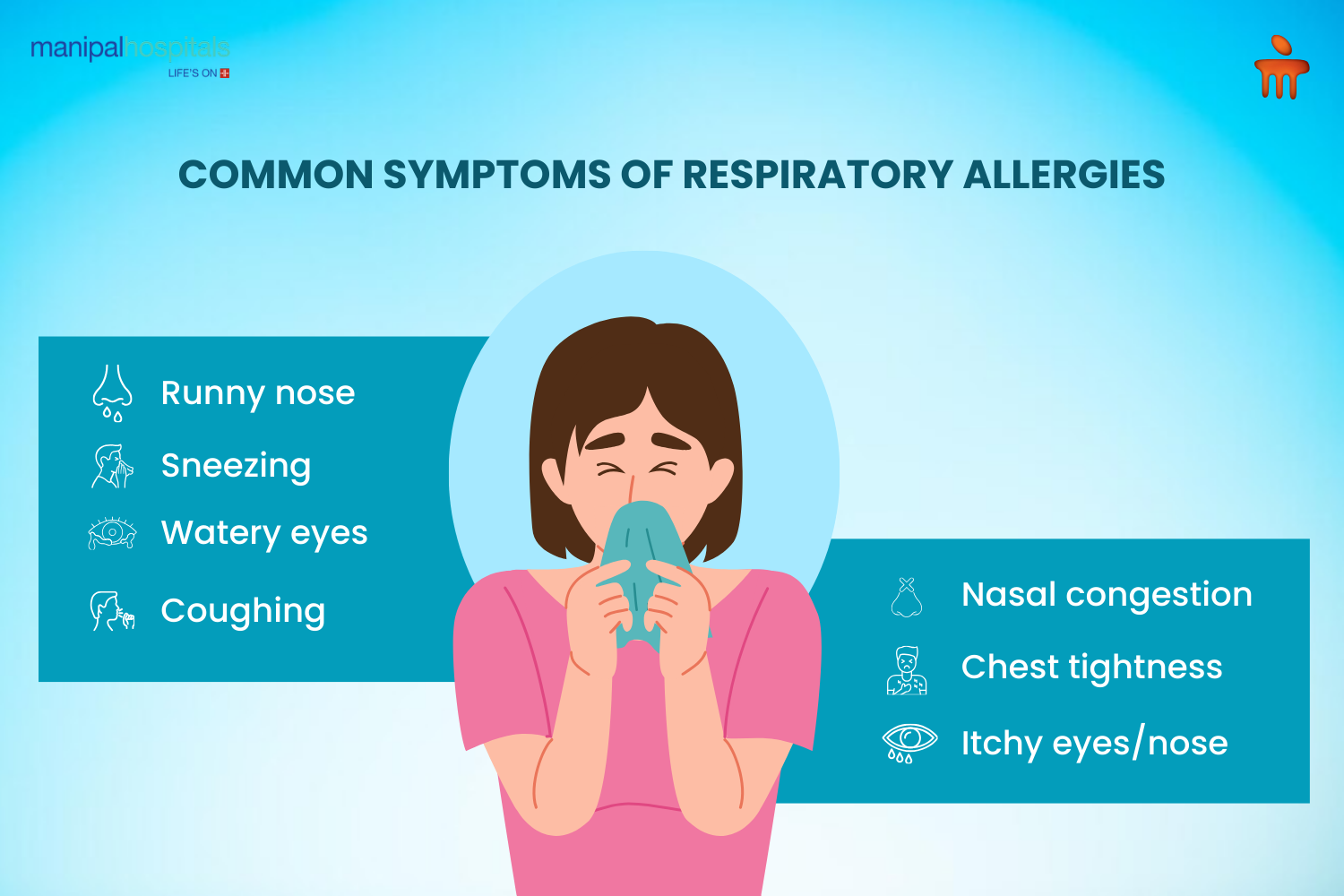
Respiratory allergies are your immune system's responses to any normally harmless substance. Your immune system produces antibodies against a harmless substance that it falsely identifies as harmful, called an allergen. Whenever you come in contact with the allergen, your immune system produces allergic chemicals in your bloodstream, and you may experience allergic symptoms.
Synopsis
What Are Respiratory Allergies? Know the Symptoms

As doctors, we commonly come across patients with respiratory allergies, especially in their upper respiratory tract. Allergic reactions occur when your body identifies any foreign body, and your immune system produces antibodies against those foreign bodies or allergens. Some common allergies are Allergic Rhinitis or hay fever, Allergic Asthma, and Allergic Conjunctivitis.
You may experience the following symptoms if you have any respiratory allergies:
- Runny nose
- Sneezing
- Watery eyes
- Blocked nose
- Coughing
- Chest pain or tightness
- Itching of the eyes and nose
Causes of Respiratory Allergies
We encounter several foreign particles and allergens in our daily lives. Some of us may be prone to those allergens, and these foreign bodies may thus cause allergic reactions. Some of the important causes of respiratory allergies are:
- City pollution and fumes
- Dust Particles
- Pet allergens
- Pollen
- Mould
- Latex
How to Diagnose Respiratory Allergies?
Doctors may suggest you undergo skin prick tests and blood tests to identify specific allergens that trigger your symptoms. Skin tests involve injecting allergens into the skin or dropping allergens on the skin and then watching it. The Radioallergosorbent test (RAST) and Enzyme-Linked Immunosorbent Assay (ELISA) test are preferred in blood tests to test allergy-specific antibodies. A skin test is more reliable than a blood test.
Read our blog: Common Obstructive Lung Diseases: Symptoms, Diagnosis, and Management
How to Manage Respiratory Allergies?
There is no cure for allergy, but it can be managed by changing lifestyle and having some anti-allergic drugs. If you are allergic to something, you must take preventive measures and follow up on your doctor’s advice. Getting counselled by a doctor helps to know the cause of the allergy and the best ways to come out of this condition.
The treatment involves a holistic combination of treatment methods, like lifestyle modification, following preventive measures, and medical treatment. Prevention of respiratory allergies involves preventing exposure to the allergen and being aware of your surroundings. Your doctor may suggest medications such as antihistamine tablets and sprays which can help prevent allergy.
Have an emergency action plan ready if you have severe respiratory allergies or allergic asthma. Bring along prescribed rescue medications like inhalers and medicines in case of an allergic reaction or asthma attack, with you whenever you step outside your home.
An Emergency Action Plan
|
Symptoms |
Action |
What to Do |
|
Mild Symptoms (sneezing, itchy eyes, runny nose) |
Monitor symptoms |
|
|
Moderate Symptoms (coughing, wheezing, shortness of breath, chest tightness) |
Take immediate action |
|
|
Severe Symptoms (extreme difficulty breathing, swelling of the face or throat, bluish lips or nails) |
Call emergency services immediately |
|
|
After Treatment (once symptoms improve) |
Follow up care |
|
Home Remedies for Respiratory Allergies
Some lifestyle tips or home remedies to protect yourself from mild respiratory allergies can be:
-
Saline Nasal Rinse: Saline solution can be used in several ways to flush the nose, clear allergens such as pollen or dust, and relieve congestion and irritation - common respiratory allergy symptoms.
-
Steam Inhalation: Steam opens nasal passages, helps soothe the respiratory tract, and relieves nasal congestion. For additional effect, a few drops of eucalyptus or peppermint oil may be added.
-
Keep Indoor Air Clean: Air purifiers, dusting, and vacuuming reduce airborne allergens in your house and keep the environment cleaner.
-
Reduce Exposure to Smoke: Avoiding smoking and exposure to secondhand smoke can help prevent mild respiratory allergies.
-
Ginger and Turmeric Tea: Ginger and turmeric are both anti-inflammatory and can help reduce symptoms of respiratory allergies.
Untreated allergies may cause chronic inflammation and damage to your lungs. So, be aware of the allergen causing your allergy, so you can get proper counselling from your ENT Specialist, and protect yourself from respiratory allergies.
FAQ's
The most common allergens are pollen, dust mites, mould, animal dander, smoke, and chemical fumes.
Mild symptoms like sneezing, itchy eyes, and runny nose can be managed at home by prescribed antihistamines (oral or nasal spray) as directed by your pulmonologist. Avoid allergens if possible and use a saline nasal spray for congestion. Monitor the symptoms, and if they worsen after taking medications, seek medical help without delay.
You may have a respiratory allergy if you frequently encounter the following symptoms when exposed to an allergen:
- Runny nose
- Sneezing
- Coughing
- Wheezing
- Tightness in the chest





















 4 Min Read
4 Min Read















